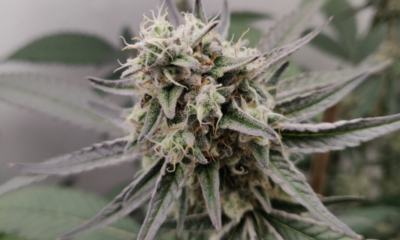Politics
Marijuana Amendments Cleared For House Floor Votes

A key congressional committee advanced a series of marijuana-related amendments on Tuesday, including a rider seeking to block the Department of Justice (DOJ) from interfering in all state-legal cannabis programs. The measures, which also include proposals shielding tribal marijuana laws and allowing military veterans to receive medical cannabis recommendations from government doctors, will now move to the House floor for consideration.
More than a dozen drug policy amendments came before the House Rules Committee, with the panel approving several for potential attachment to a large-scale bill funding parts of the federal government for Fiscal Year 2020.
Reform advocates were most interested in ensuring that the proposal seeking to prohibit DOJ agencies such as the Drug Enforcement Administration (DEA) from using funds to intervene in state-legal marijuana activities advanced. The committee didn’t disappoint, ruling it in order for a vote by the full House.
Advocates are optimistic that the measure, sponsored by Rep. Earl Blumenauer (D-OR), will be approved because a similar amendment came just nine flipped votes short of passage on the House floor in 2015. Since then, the number of states with legalization has more than doubled, meaning that there are a lot more lawmakers who now represent constituents who would be covered by the proposal’s protections than was the case at the time of the prior vote.
State medical cannabis laws are currently shielded from Department of Justice interference under a similar but narrower spending rider than has been enacted and extended annually since 2014.
Blumenauer’s broader amendment seeking to expand protections to local laws allowing recreational marijuana use and sales is cosponsored by Reps. Tom McClintock (R-CA) and Eleanor Holmes Norton (D-DC).
In an interview with Marijuana Moment, the Oregon congressman was reluctant to predict a specific number of votes for the measure on the floor, but did note that he was confident of its passage and said the tally would be “an indication of where we’re going with the overall reform effort.”
A big week ahead for cannabis reform. With every committee hearing and amendment introduced, we are one step closer to ending the senseless prohibition of cannabis and the failed war on drugs.
— Earl Blumenauer (@repblumenauer) June 19, 2019
If the House does approve the measure when the bill comes to the floor, expected later this week, it would not necessarily be enacted into law, as the Senate has not yet begun its consideration of companion spending legislation.
Another amendment cleared for floor consideration would allow Indian tribes to implement their own marijuana policies without the threat of Justice Department intervention. That measure is sponsored by Blumenauer and Rep. Deb Haaland (D-NM), one of the first two Native American women ever elected to Congress.
Blumenauer said he is “optimistic” about that proposal’s chances on the floor.
Another key amendment cleared for a vote would let Department of Veterans Affairs (VA) doctors to issue medical cannabis recommendations to military veterans in states where it is legal. In years past, both the House and Senate have approved similar measures, but the rider has never been enacted into law.
Other proposals advancing toward votes by the full House include ones focused on CBD regulations, adding a U.S. territory to the list of jurisdictions protected by an existing medical cannabis rider and shifting money away from DEA and toward drug treatment.
These amendments were cleared for floor action:
STATES AND TERRITORIES: Blocks DOJ from interfering with marijuana laws in states, territories and Washington, D.C.
USVI: Adds U.S. Virgin Islands to list of jurisdictions shielded from DOJ medical cannabis interference.
TRIBES: Blocks DOJ from interfering with tribal marijuana laws.
VETERANS: Blocks VA from punishing doctors for recommending medical cannabis in states that have legalized or from denying benefits to veterans for participating in medical cannabis programs.
CBD: Directs FDA to set a safe CBD level for foods and dietary supplements.
TREATMENT FUNDING: Moves $5 million from DEA to an opioid treatment program.
While the Rules Committee had made it a practice to block all marijuana amendments under the leadership of then-Chairman Pete Sessions (R-TX) during the last several years of Republican House control, new Chairman James McGovern (D-MA) has pledged to let cannabis measures advance under the chamber’s Democratic majority.
“I’m not going to block marijuana amendments,” he said shortly after his party took back control of the House in last year’s midterm elections. “People ought to bring them to the floor, they should be debated and people ought to vote the way they feel appropriate.”
Last week, when considering a separate funding bill, McGovern’s panel advanced an amendment put forth by Rep. Alexandria Ocasio-Cortz (D-NY) aimed at removing roadblocks to research on Schedule I drugs like marijuana, psilocybin and MDMA, but it went on to be soundly defeated on the House floor.
The committee, citing procedural issues, blocked a separate measure on the earlier spending legislation from Rep. Lou Correa (D-CA) aimed at shielding colleges and universities from being punished by the Department of Education for allowing medical cannabis on campus.
Several amendments filed on the current appropriations bill before the committee on Tuesday were withdrawn by their sponsors before the panel could make a decision about floor consideration, in some cases because they had similar measures they decided to press forward with.
These amendments were withdrawn by sponsors:
SAFE CONSUMPTION SITES: Blocks DOJ from preventing states and localities from establishing and implementing safe consumption sites for illegal drugs.
TRIBES: Blocks DOJ from interfering with tribal medical cannabis laws.
TRIBES: Blocks DOJ from interfering with tribal marijuana laws in states that have legalized.
TRIBES: Blocks DOJ from interfering with tribal medical cannabis laws in states that have legalized.
VETERANS: Blocks DOJ from punishing VA doctors or employees for recommending medical cannabis in states that have legalized.
STATES AND TERRITORIES: Blocks DOJ from interfering with state marijuana and those in Washington, D.C. and U.S. territories.
Though advocates are backing several pieces of standalone marijuana legislation, reform proposals are increasingly being pursued through the appropriations process. Several recent committee reports have called for the expedition of policies to regulate CBD, implement hemp regulations, lift barriers to marijuana research, prevent impaired driving and protect veteran benefits for those using cannabis in compliance with state law.
The House Appropriations Committee also advised the federal government to consider updating its policy concerning employees who use marijuana in accordance with state law.
Last week, the same panel approved a spending bill that includes language providing protections for banks that service state-legal marijuana business while also removing a longstanding rider that has blocked Washington, D.C. from using its own local tax dollars to legalize and regulate cannabis sales.
And cannabis reform activity is heating up in Congress beyond appropriations.
On Wednesday, the House Small Business Committee will hold a hearing on issues facing small businesses in the marijuana industry. And on Thursday, the House Veterans’ Affairs Committee will consider several bills focused on medical cannabis and military veterans.
Meanwhile, a standalone bill to increase marijuana businesses’ access to banks was cleared by the House Financial Services Committee in March. Blumenauer told Marijuana Moment that he anticipates a floor vote on that legislation next month.
Photo courtesy of Philip Steffan.
















